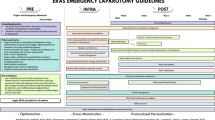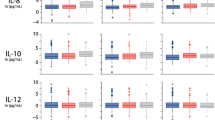Abstract
Purpose
Postoperative delirium (POD) commonly occurs after major abdominal surgery and is associated with increased morbidity and mortality. There have been many studies on the relationship between POD and various surgeries, but research on POD after pancreatic cancer surgery is limited. The aim of this study was to identify the incidence and risk factors of POD after pancreatic cancer surgery.
Methods
The subjects of this retrospective analysis were 196 patients who were transferred for postoperative care after pancreatic cancer surgery, to a 12-bed critical care medicine ward at Shandong Provincial Hospital, affiliated with Shandong First Medical University, between January 2015 and December 2019. The patients were divided according to whether they suffered POD into a delirium group and a non-delirium group. Delirium was assessed using the Confusion Assessment Method for the Intensive Care Unit and two independent medical practitioners analyzed all the data. Univariate and multiple logistic regression analyses were performed.
Results
The overall delirium incidence was 20.41%, which increased to 29.03% for patients aged ≥ 70 years. POD was associated with age, smoking, the American Society of Anesthesiologists classification, the Acute Physiology and Chronic Health Evaluation II score, and the TNM stage of the cancer. The variables concerning sex, drinking, hypertension, a history of cerebral disease, surgery type, operation time, amount of bleeding, and the intraoperative use of dexmedetomidine did not differ significantly between the two groups. There was no significant difference in the length of ICU stay, with the exclusion of long-term stay for complications, between the groups, but POD tended to prolong the postoperative hospital stay and increase the risk of mortality. There was also a gradual decline in the incidence of POD between 2015 and 2019, especially from 2015 to 2018, after preventive measures were implemented.
Conclusion
POD is related to many risk factors and worthy of attention. Appropriate management can reduce its incidence or at least shorten its duration.

Similar content being viewed by others
References
Conlon KC, Klimstra DS, Brennan MF. Long-term survival after curative resection for pancreatic ductal adenocarcinoma. Clinicopathologic analysis of 5-year survivors. Ann Surg. 1996;223:273–9.
Cameron JL, Riall TS, Coleman J, Belcher KA. One thousand consecutive pancreaticoduodenectomies. Ann Surg. 2006;244:10–5.
Lillemoe KD, Rikkers LF. Pancreaticoduodenectomy: the golden era. Ann Surg. 2006;244:16–7.
Kirchhoff P, Dincler S, Buchmann P. A multivariate analysis of potential risk factors for intra- and postoperative complications in 1316 elective laparoscopic colorectal procedures. Ann Surg. 2008;248:259–65.
de la Motte L, Jensen LP, Vogt K, Kehlet H, Schroeder TV, Lonn L. Outcomes after elective aortic aneurysm repair: a nationwide Danish cohort study 2007–2010. Eur J Vasc Endovasc Surg. 2013;46:57–64.
Markar SR, Smith IA, Karthikesalingam A, Low DE. The clinical and economic costs of delirium after surgical resection for esophageal malignancy. Ann Surg. 2013;258:77–81.
Takeuchi M, Takeuchi H, Fujisawa D, Miyajima K, Yoshimura K, Hashiguchi S, et al. Incidence and risk factors of postoperative delirium in patients with esophageal cancer. Ann Surg Oncol. 2012;19:3963–70.
Petersen PB, Jørgensen CC, Kehlet H. Lundbeck foundation centre for fast-track hip and knee replacement collaborative group. Delirium after fast-track hip and knee arthroplasty—a cohort study of 6331 elderly patients. Acta Anaesthesiol Scand. 2017;61:767–72.
Bhattacharya B, Maung A, Barre K, Maerz L, Rodriguez-Davalos MI, Schilsky M, et al. Postoperative delirium is associated with increased intensive care unit and hospital length of stays after liver transplantation. J Surg Res. 2017;207:223–8.
Lescot T, Karvellas CJ, Chaudhury P, Tchervenkov J, Paraskevas S, Barkun J, et al. Postoperative delirium in the intensive care unit predicts worse outcomes in liver transplant recipients. Can J Gastroenterol. 2013;27:207–12.
Booka E, Kamijo T, Matsumoto T, Takeuchi M, Kitani T, Nagaoka M, et al. Incidence and risk factors for postoperative delirium after major head and neck cancer surgery. J Craniomaxillofac Surg. 2016;44:890–4.
Smulter N, Lingehall HC, Gustafson Y, Olofsson B, Engström KG. Delirium after cardiac surgery: incidence and risk factors. Interact Cardiovasc Thorac Surg. 2013;17:790–6.
Hughes CG, Boncyk CS, Culley DJ, Fleisher LA, Leung JM, McDonagh DL, et al. American society for enhanced recovery and perioperative quality initiative joint consensus statement on postoperative delirium prevention. Anesth Analg. 2020;130:1572–90.
Association AP. Diagnostic and statistical manual of mental disorders. 5th ed. Washington: American Psychiatric Association; 2013.
Hargrave A, Bastiaens J, Bourgeois JA, Neuhaus J, Josephson SA, Chinn J, et al. Validation of a nurse-based delirium-screening tool for hospitalized patients. Psychosomatics. 2017;58:594–603.
Guo Y, Jia P, Zhang J, Wang X, Jiang H, Jiang W. Prevalence and risk factors of postoperative delirium in elderly hip fracture patients. J Int Med Res. 2016;44:317–27.
Witlox J, Eurelings LS, de Jonghe JF, Kalisvaart KJ, Eikelenboom P, van Gool WA. Delirium in elderly patients and the risk of postdischarge mortality, institutionalization, and dementia: a meta-analysis. JAMA. 2010;304:443–51.
Inouye SK, Westendorp RG, Saczynski JS. Delirium in elderly people. Lancet. 2014;383:911–22.
Rengel KF, Pandharipande PP, Hughes CG. Postoperative delirium. Presse Med. 2018;47:e53–64.
Brouquet A, Cudennec T, Benoist S, Moulias S, Beauchet A, Penna C, et al. Impaired mobility, ASA status and administration of tramadol are risk factors for postoperative delirium in patients aged 75 years or more after major abdominal surgery. Ann Surg. 2010;251:759–65.
Olin K, Eriksdotter-Jönhagen M, Jansson A, Herrington MK, Kristiansson M, Permert J. Postoperative delirium in elderly patients after major abdominal surgery. Br J Surg. 2005;92:1559–64.
Korc-Grodzicki B, Sun SW, Zhou Q, Iasonos A, Lu B, Root JC, et al. Geriatric assessment as a predictor of delirium and other outcomes in elderly patients with cancer. Ann Surg. 2015;261:1085–90.
Ganai S, Lee KF, Merrill A, Lee MH, Bellantonio S, Brennan M, et al. Adverse outcomes of geriatric patients undergoing abdominal surgery who are at high risk for delirium. Arch Surg. 2007;142:1072–8.
Vasilevskis EE, Han JH, Hughes CG, Ely EW. Epidemiology and risk factors for delirium across hospital settings. Best Pract Res Clin Anaesthesiol. 2012;26:277–87.
Potter J, George J, Guideline Development Group. The prevention, diagnosis and management of delirium in older people: concise guidelines. Clin Med (Lond). 2006;6:303–8.
Ely EW, Inouye SK, Bernard GR, Gordon S, Francis J, May L, et al. Delirium in mechanically ventilated patients: validity and reliability of the confusion assessment method for the intensive care unit (CAM-ICU). JAMA. 2001;286:2703–10.
Sessler CN, Gosnell MS, Grap MJ, Brophy GM, O’Neal PV, Keane KA, et al. The richmond agitation-sedation scale: validity and reliability in adult intensive care unit patients. Am J Respir Crit Care Med. 2002;166:1338–44.
Dubljanin-Raspopović E, Markovic Denić L, Marinković J, Grajić M, Tomanovic Vujadinović S, Bumbaširević M. Use of early indicators in rehabilitation process to predict one-year mortality in elderly hip fracture patients. Hip Int. 2012;22:661–7.
Bickel H, Gradinger R, Kochs E, Förstl H. High risk of cognitive and functional decline after postoperative delirium. A three-year prospective study. Dement Geriatr Cogn Disord. 2008;26:26–31.
Kat MG, Vreeswijk R, de Jonghe JF, van der Ploeg T, van Gool WA, Eikelenboom P, et al. Long-term cognitive outcome of delirium in elderly hip surgery patients. A prospective matched controlled study over two and a half years. Dement Geriatr Cogn Disord. 2008;26:1–8.
Zakriya K, Sieber FE, Christmas C, Wenz JF Sr, Franckowiak S. Brief postoperative delirium in hip fracture patients affects functional outcome at three months. Anesth Analg. 2004;98:1798–802.
Scholz AF, Oldroyd C, McCarthy K, Quinn TJ, Hewitt J. Systematic review and meta-analysis of risk factors for postoperative delirium among older patients undergoing gastrointestinal surgery. Br J Surg. 2016;103:e21–8.
Gallagher TK, McErlean S, O’Farrell A, Hoti E, Maguire D, Traynor OJ, et al. Incidence and risk factors of delirium in patients post pancreaticoduodenectomy. HPB (Oxford). 2014;16:864–9.
Ito Y, Abe Y, Handa K, Shibutani S, Egawa T, Nagashima A, et al. Postoperative delirium in patients after pancreaticoduodenectomy. Dig Surg. 2017;34:78–85.
Mizuno S, Takeuchi S, Kishiwada M, Mizutani N, Matsuda M, Sekoguchi N, et al. Incidence and risk factors of postoperative delirium following pancreatic surgery: does the administration of TJ-54 reduce the incidence of delirium. Dig Surg. 2018;35:1–10.
Yang Y, Zhao X, Dong T, Yang Z, Zhang Q, Zhang Y. Risk factors for postoperative delirium following hip fracture repair in elderly patients: a systematic review and meta-analysis. Aging Clin Exp Res. 2017;29:115–26.
Zhu Y, Wang G, Liu S, Zhou S, Lian Y, Zhang C, et al. Risk factors for postoperative delirium in patients undergoing major head and neck cancer surgery: a meta-analysis. Jpn J Clin Oncol. 2017;47:505–11.
McSorley ST, Dolan RD, Roxburgh CS, Horgan PG, MacKay GJ, McMillan DC. Possible dose dependent effect of perioperative dexamethasone and laparoscopic surgery on the postoperative systemic inflammatory response and complications following surgery for colon cancer. Eur J Surg Oncol. 2019;45(9):1613–8.
Duan X, Coburn M, Rossaint R, Sanders RD, Waesberghe JV, Kowark A. Efficacy of perioperative dexmedetomidine on postoperative delirium: systematic review and meta-analysis with trial sequential analysis of randomised controlled trials. Br J Anaesth. 2018;121:384–97.
Carr ZJ, Cios TJ, Potter KF, Swick JT. Does dexmedetomidine ameliorate postoperative cognitive dysfunction? A brief review of the recent literature. Curr Neurol Neurosci Rep. 2018;18:64.
Ito K, Suka Y, Nagai M, Kawasaki K, Yamamoto M, Koike D, et al. Lower risk of postoperative delirium using laparoscopic approach for major abdominal surgery. Surg Endosc. 2019;33:2121–7.
Shin YH, Kim DK, Jeong HJ. Impact of surgical approach on postoperative delirium in elderly patients undergoing gastrectomy: laparoscopic versus open approaches. Korean J Anesthesiol. 2015;68:379–85.
Funding
Shandong Province Focuses on Research and Development plan (NO. 2015GGH318009).
Author information
Authors and Affiliations
Corresponding author
Ethics declarations
Conflict of interest
Bao Zhao and his co-authors have no conflicts of interest to declare.
Additional information
Publisher's Note
Springer Nature remains neutral with regard to jurisdictional claims in published maps and institutional affiliations.
Rights and permissions
Springer Nature or its licensor (e.g. a society or other partner) holds exclusive rights to this article under a publishing agreement with the author(s) or other rightsholder(s); author self-archiving of the accepted manuscript version of this article is solely governed by the terms of such publishing agreement and applicable law.
About this article
Cite this article
Zhao, B., Ji, HS., Xu, CY. et al. Incidence and risk factors of postoperative delirium after pancreatic cancer surgery: a retrospective study. Surg Today 53, 736–742 (2023). https://doi.org/10.1007/s00595-022-02614-4
Received:
Accepted:
Published:
Issue Date:
DOI: https://doi.org/10.1007/s00595-022-02614-4




